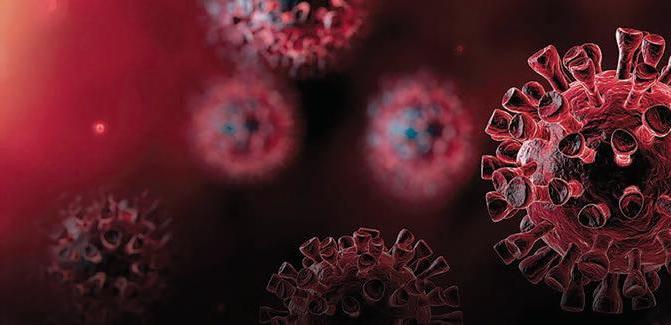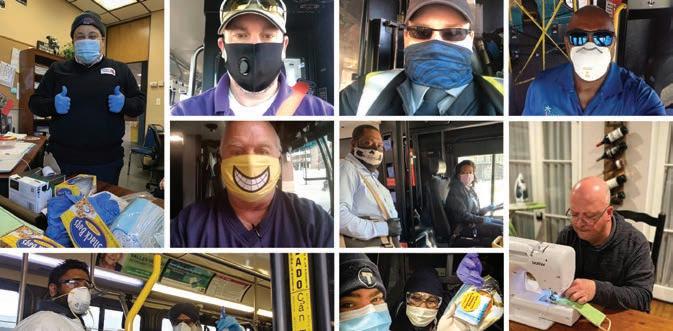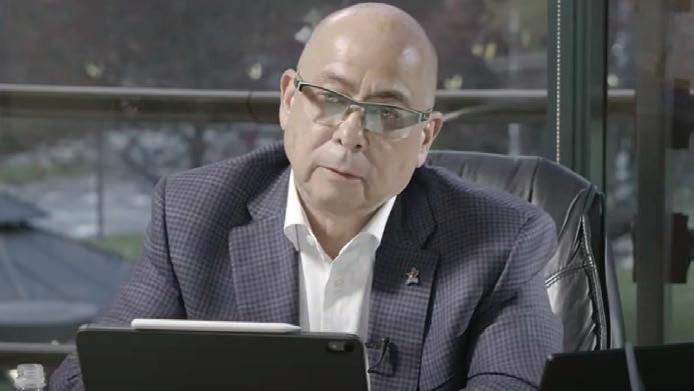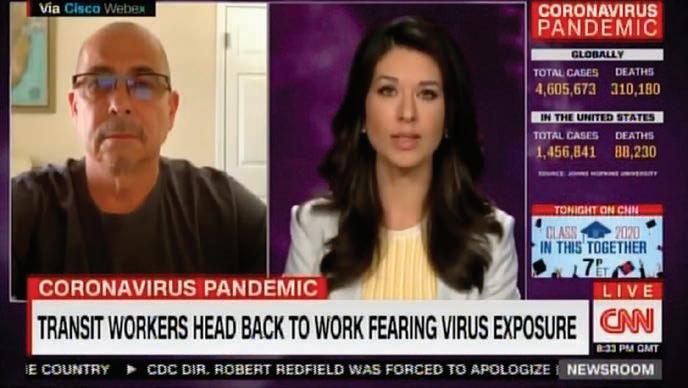
8 minute read
Index page
CONTENT
APR/MAY/JUNE 2020 Vol. 129, No. 2
ATU TAKES CORONAVIRUS HEAD-ON
5
INTERNATIONAL, LOCALS FIGHT BACK AGAINST CORONAVIRUS

25
International Officers & General Executive Board ATU-COPE
International President’s Message:
You are not alone Index page Remember Our Fallen ATU: Black Lives Matter The Coronavirus Response: Trump vs Biden How a Union saved public transit
International Executive Vice President’s
Message: We mourn
International Secretary-Treasurer’s Message:
ATU is fighting for you 20
22
23 28 Canadian Agenda: ATU Canada fights for members throughout pandemic SAFE SERVICE NOW: “We Don’t Come to Work to Die” A Survey of Local Transit Unions on the Frontlines of COVID-19 History: ATU and the 1918 Spanish Flu Costa appoints NJ State Council Chair Ray Greaves IVP International President names Workforce Development Coordinator
29 ATU locals celebrate Rosa Parks’ legacy on Transit Equity Day
After strike, MTA Paratransit Workers
Reach Deal with MV Transportation 30 ATU loses beloved, former IEVP:
Mike Siano
31
32 Winnipeg members call for federal funding as city reopens ATU awards 2019 Heintzman-Baker Scholarships Canadian properties score ATU representation Hamilton County, OH, voters make history, raise sales tax to fund transit
33 Translations (Spanish and French Canadian)
37
In Memoriam 40 Stay Connected with the ATU App
ATU TAKES CORONAVIRUS HEAD-ON

International President John Costa confers with local and international officers during a live telephone town hall, as he announces the launch of the ATU COVID-19 Command and Response Center, March 18, 2020.

The coronavirus pandemic is proving to be the most dangerous threat transit workers have faced since the 1918 Spanish Flu. As of this writing, COVID-19 has sickened over 1,500 transit employees and taken over 160 transit workers’ lives; more than 50 of them ATU members.
Since the outbreak in North America, the International has been working with locals to protect the health and livelihoods of our members as they work on the frontlines.
An extensive survey of ATU locals conducted in April found that 50% of their employers were not providing masks and gloves to their workers; and many of those employers who had issued personal protective equipment (PPE) lacked enough for each worker. Many were not protecting maintenance or cleaning staff adequately or did not have enough replacements in stock to maintain sanitary use. Union demands urgent action The shocking report reaffirmed the Union’s decision early in March to demand that transit employers implement comprehensive plans to protect our members and reduce the exposure of the riding public.
The Union began its aggressive Safe Service Now campaign, mobilizing local unions to win our ten demands. The International encouraged local officers to pressure employers to protect members and swiftly respond to reports of possible exposure to the virus. ATU locals responded, developing petitions, flooding agency video calls, mobilizing members for socially-distanced pickets and more.
Union launches ATU COVID-19 Command Center and website Recognizing the gravity and potential impact of the coronavirus on our members, ATU immediately began issuing recommendations to locals, including a list of things members can do to avoid and prevent infection. The Union also sent memos to all local officers with information about disinfecting vehicles, understanding personal protective equipment, and addressing labor relations issues.
Weekly updates, discussion with officers In mid-March, International President Costa conducted a live telephone town hall with local and international officers
— continued on page 6
to discuss the crisis and launch the ATU COVID-19 Command and Response Center and the ATU COVID-19 webpage. The telephone town halls have continued weekly to provide important updates and coordinate ATU’s campaign against the pandemic.
The Command and Response Center has provided local officers with a rapid response mechanism to address the problems emerging during the battle with the pandemic. An ATU COVID-19 email inbox and telephone hotline staffed around the clock by the international was set up to answer members’ questions and provide legal, bargaining, campaigns, and communications assistance.
The International also set up a COVID-19 website page at www.atu.org/covid-19 as a go-to resource for all of our concerns related to the growing pandemic. The resources provided on the webpage include informative leaflets, workplace safety checklists, tips for prevention, U.S. and Canadian legislation, information from the Centers for Disease Control (CDC) and other governmental organizations.
ATU plays key role in passage of CARES Act As ridership plummeted during state and local stay-athome orders, ATU helped secure more than $25 billion in emergency funding for transit through the Coronavirus Aid, Relief, and Economic Security (CARES) Act passed by the U.S. Congress. The Act allows transit properties to use the funding to pay employees and keep service running for essential workers. In addition, the act provides for the purchase of N-95 masks, gloves, other PPE, as well as additional cleaning and sanitizing supplies.
First member dies from COVID-19 On March 27, ATU mourned the passing of its first member from COVID-19, Local 1576-Lynnwood, WA, Shop Steward Scott Ryan.
“The tragic reality of this devastating and deadly pandemic is that it has now taken the life of one of our own – Local 1576 Shop Steward Scott Ryan – who was just 41 years old,” lamented International President John Costa. “Our heartfelt condolences go out to Scott Ryan’s family, extended family, co-workers, friends, and all those who knew him.” ATU, TWU vow ‘aggressive action’ As the pandemic escalated in early April, ATU joined with the other major U.S. transit union, the Transport Workers Union of America (TWU), to ratchet up the pressure on transit systems, vowing to take “aggressive action” if properties didn’t better protect their workers from COVID-19.
“If transit agencies don’t take immediate and dramatic steps to protect our members, there will be serious consequences,” warned TWU International President John Samuelsen.
‘Dying is no way to make a living’ Echoing the same sentiments, Costa asserted, “We are prepared to take whatever aggressive action is necessary to protect our members and their families. Nothing is off the table. Dying is no way to make a living.”
On April 8, ATU, TWU, and another transit union, International Association of Sheet Metal, Air, Rail and Transportation Workers (SMART-UTU), jointly representing over 90 percent of all transit workers, sent aletter listing our safety demands to Democratic and Republican leaders in Congress. The transit union coalition demanded that Congress direct the Federal Transit Administration (FTA) to issue emergency, mandatory standards for PPEs, provide hazard pay for essential transit workers, and direct the Occupational Safety and Health Administration (OSHA) to issue emergency temporary standards to protect transportation workers, and others.
At the same time, ATU Canada called on all provincial ministers to provide PPE for all transit workers and pushed for the federal government to offer relief to transit systems.
ATU Safe Service Now campaign On April 13, International President Costa sent a letter to every single transit agency personally informing them of the demands which have now become the centerpiece of ATU’s new, aggressive “Safe Service Now Campaign.”
Our demands:
• Provision of all recommended personal protective equipment to every worker, including gloves, masks, sanitizers, and all PPE needed. • Pandemic leave for anyone who is showing symptoms of COVID-19, who has been exposed to the virus, or who has family or childcare obligations resulting from shutdowns.
Compensating workers classified as essential during a public health crisis at least 1.5 times their normal wage. Rear door entry and fare elimination to support social distancing. Retention of employees and maintenance of wages and benefits during service curtailment. Strategic continuation of service to avoid overcrowding. Limitations on bus passenger loads to no more than 10 and paratransit to no more than 1. Limiting service access to essential workers and those seeking care. Requiring passengers to wear masks to board a transit vehicle. Provision of fully-paid, on-site testing of transit workers for COVID-19 symptoms.
Petition As part of the Safe Service Now campaign, an online petition has been posted to generate support for our demands. As of this writing more than 5,500 people have signed the petition. In addition, an aggressive social media campaign on ATU’s Facebook page and Twitter account equipped members with memes/images and videos to help build awareness of our Safe Service demands. As states began to reopen, ATU sent a letter to the U.S. National Governors Association urging them to include public transit in their planning for a PPE supply chain, and to require systems to deny service to any rider attempting to board without a face mask or cover, consistent with CDC guidelines.
ATU Canada demands emergency funding As in the U.S., Canadian transit systems suffered from decreased ridership. ATU Canada has demanded that the federal government provide emergency funding for the nation’s public transit. Prime Minister Justin Trudeau, however, dismissed the demand insisting that emergency transit funding was not a federal responsibility.
Most Canadians disagree with him. An ATU-sponsored Probe Research poll found that 78 percent of the nation

wants the federal government to allocate $5 billion in emergency funding for public transit services.
64% of transit agencies unprepared for COVID-19 In May, the International released results of an ATU survey of local unions, mentioned above, conducted to take stock of the health and safety conditions faced by members during the COVID-19 pandemic. Among the core findings, the survey found that 64% of respondents say their employer had no pandemic preparedness plan in place prior to the onset of COVID-19.
International President Costa is interviewed by CNN, May 16, asserting that “we did not take these jobs to die.”

ATU will continue to closely monitor the impact of the pandemic on our members and the riding public, and will continue to support our locals and members with critical information and assistance.
Please be sure to check the ATU COVID-19 website page - https://www.atu.org/covid-19 - which will be regularly updated as long as the coronavirus remains a threat to transit workers. v









